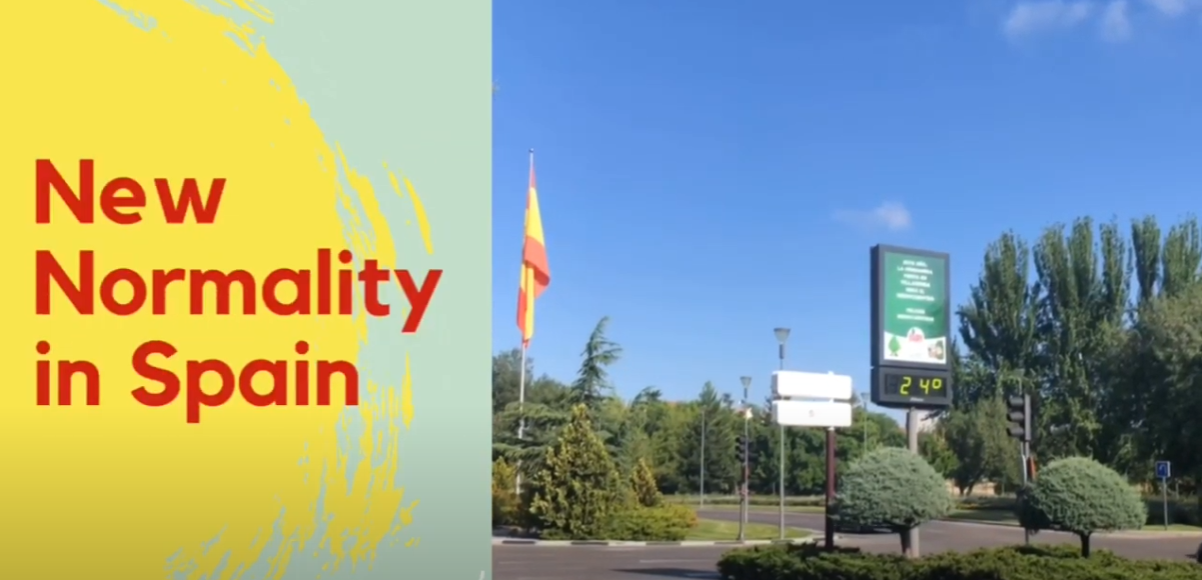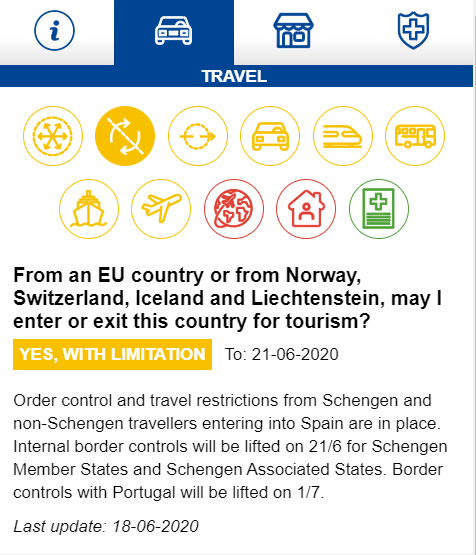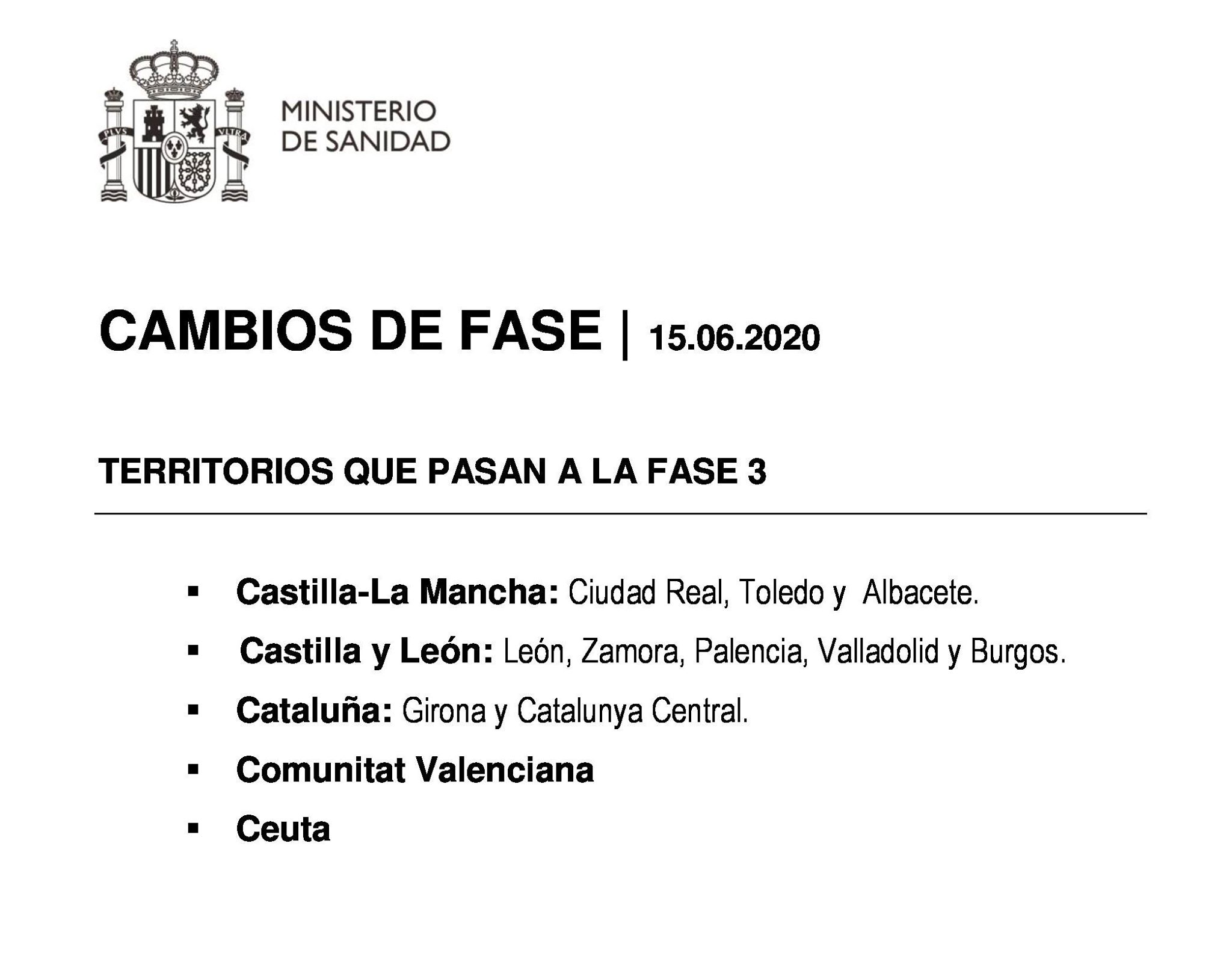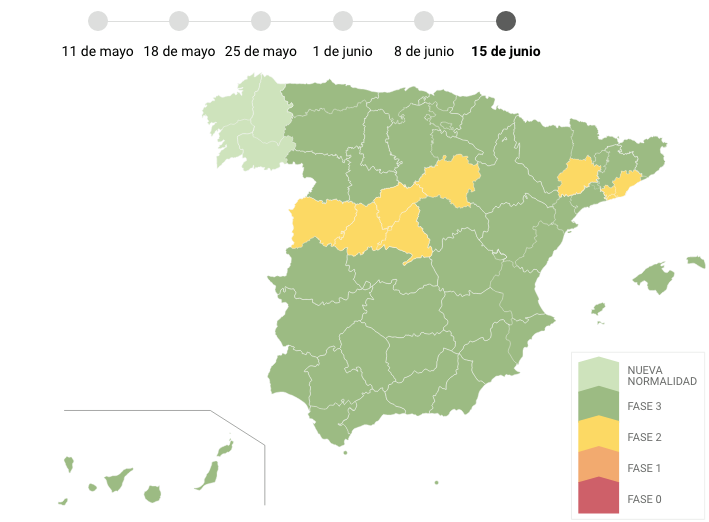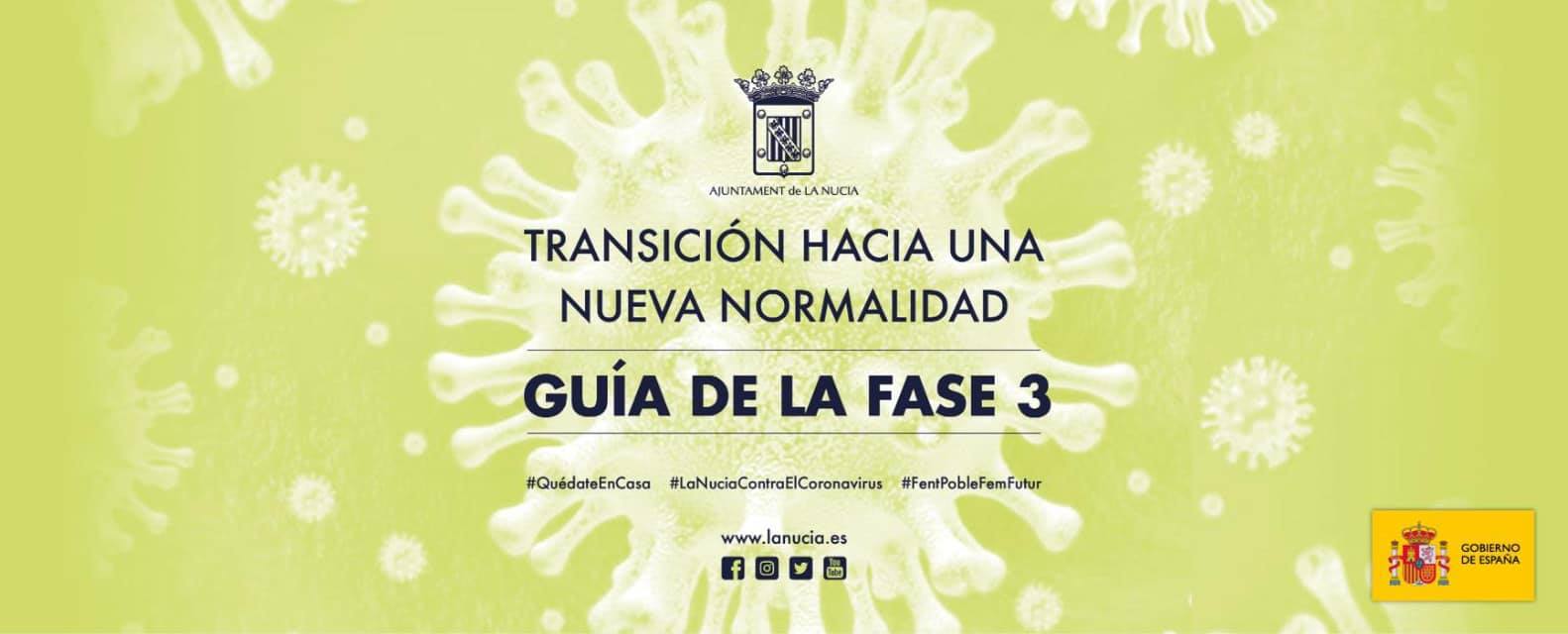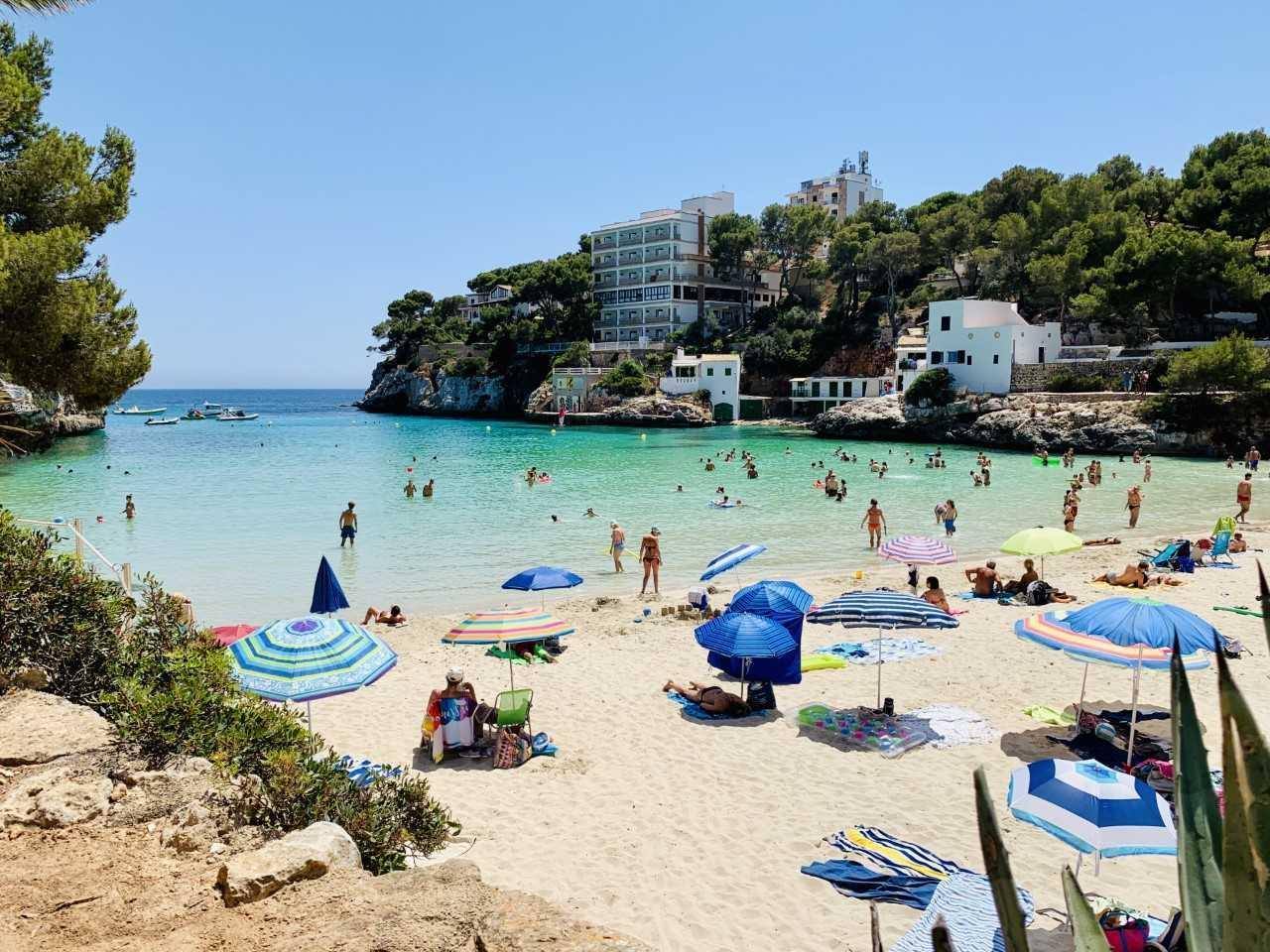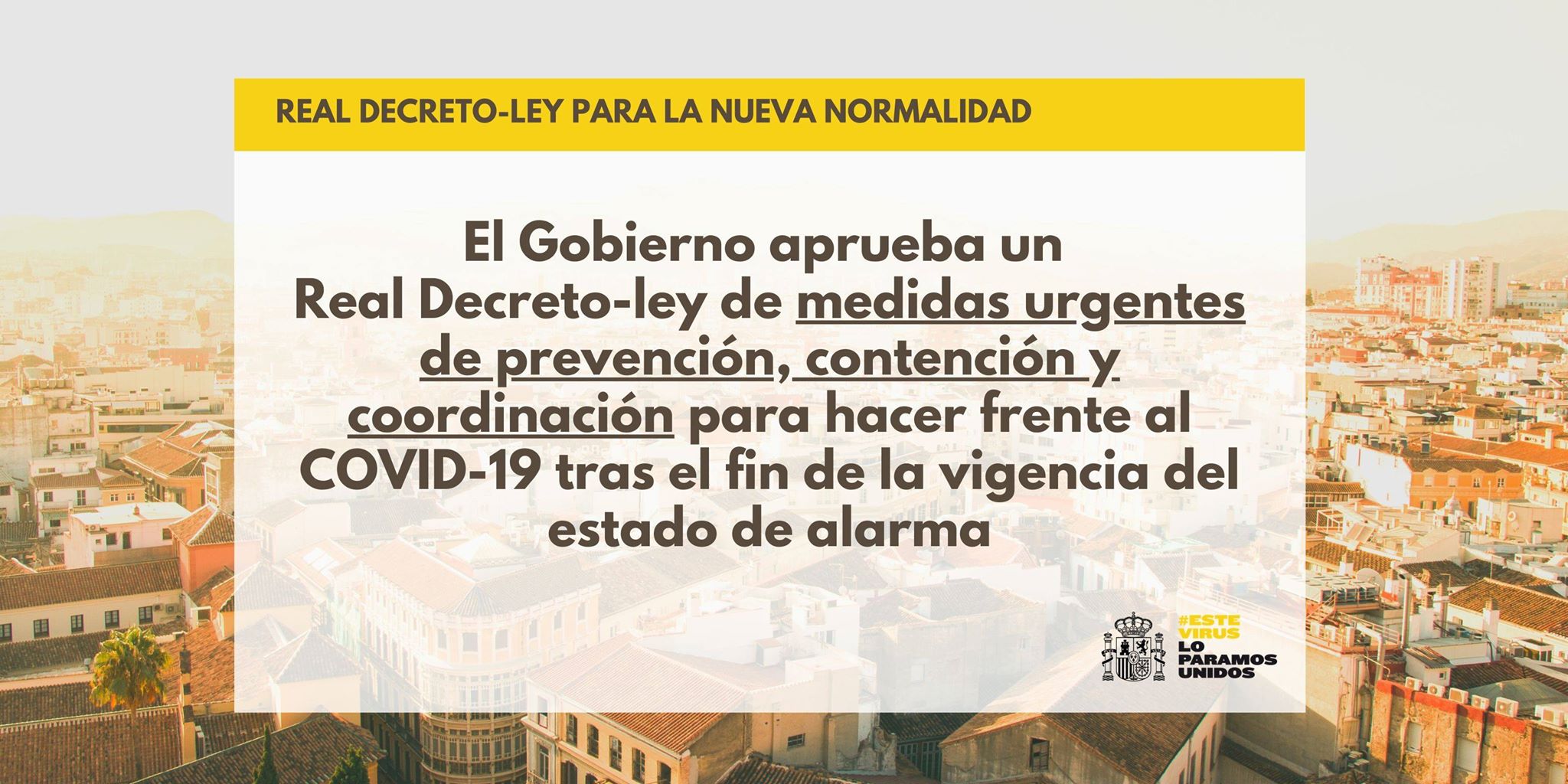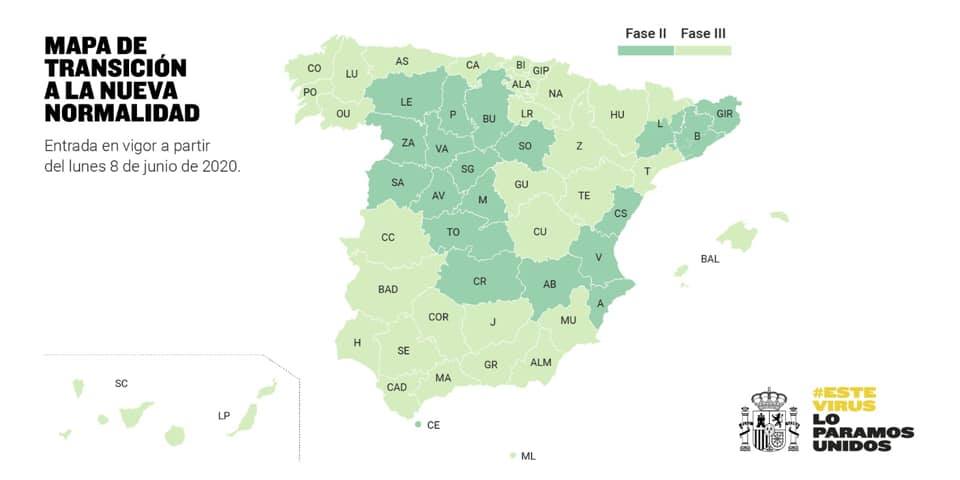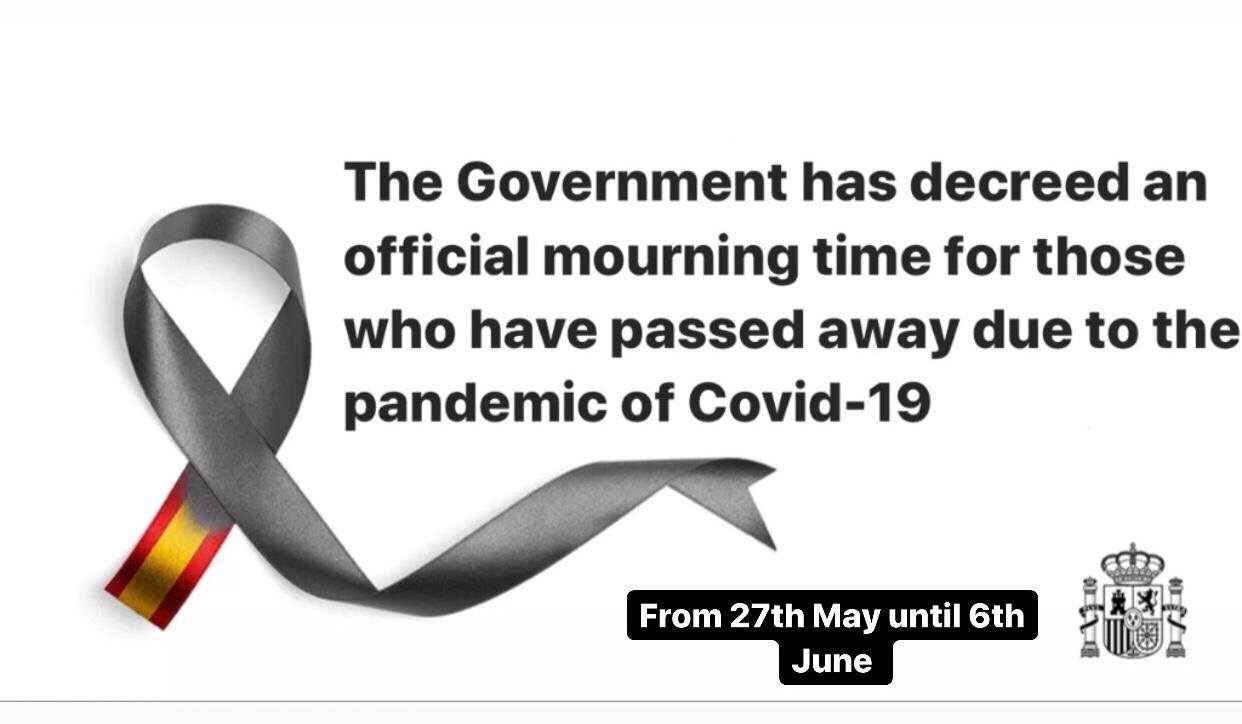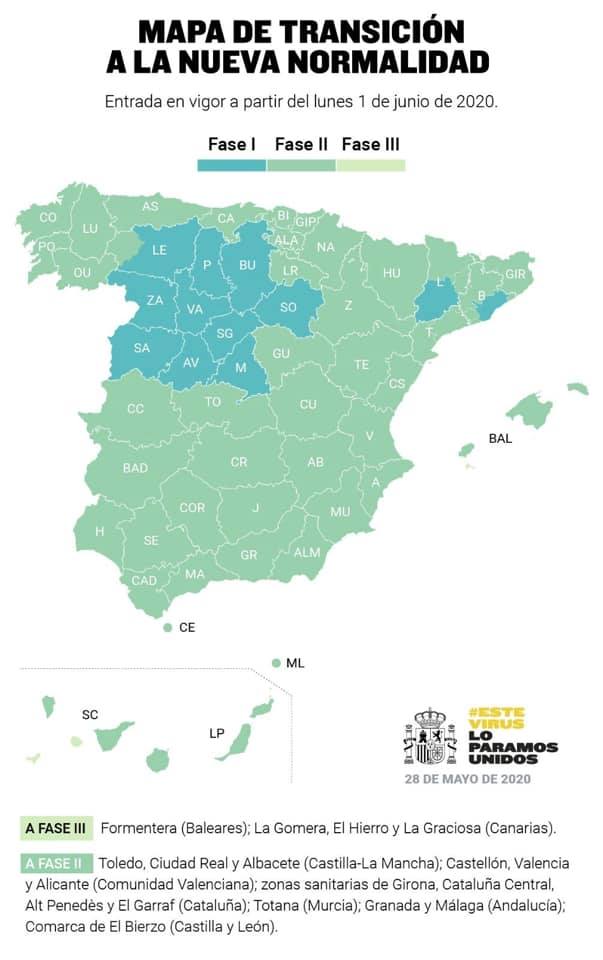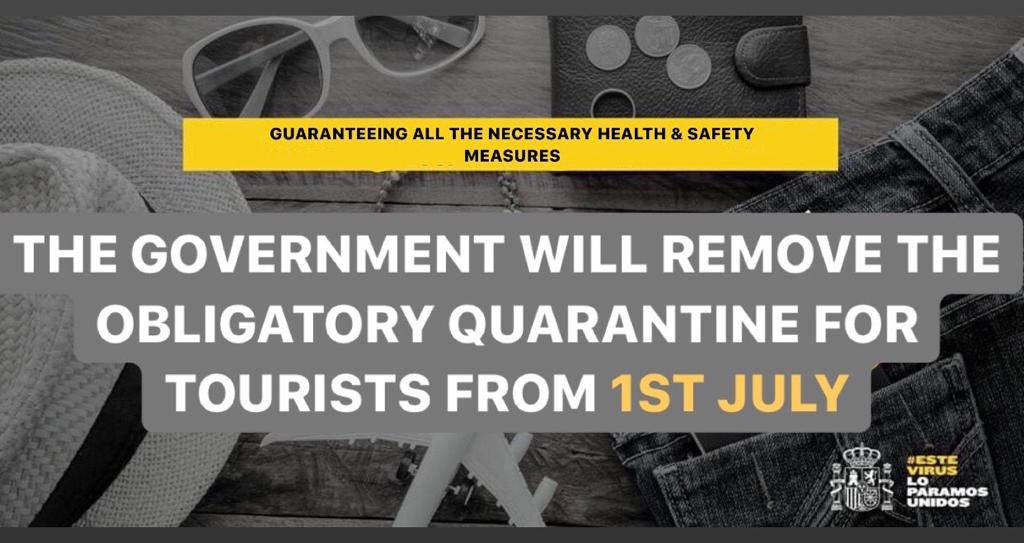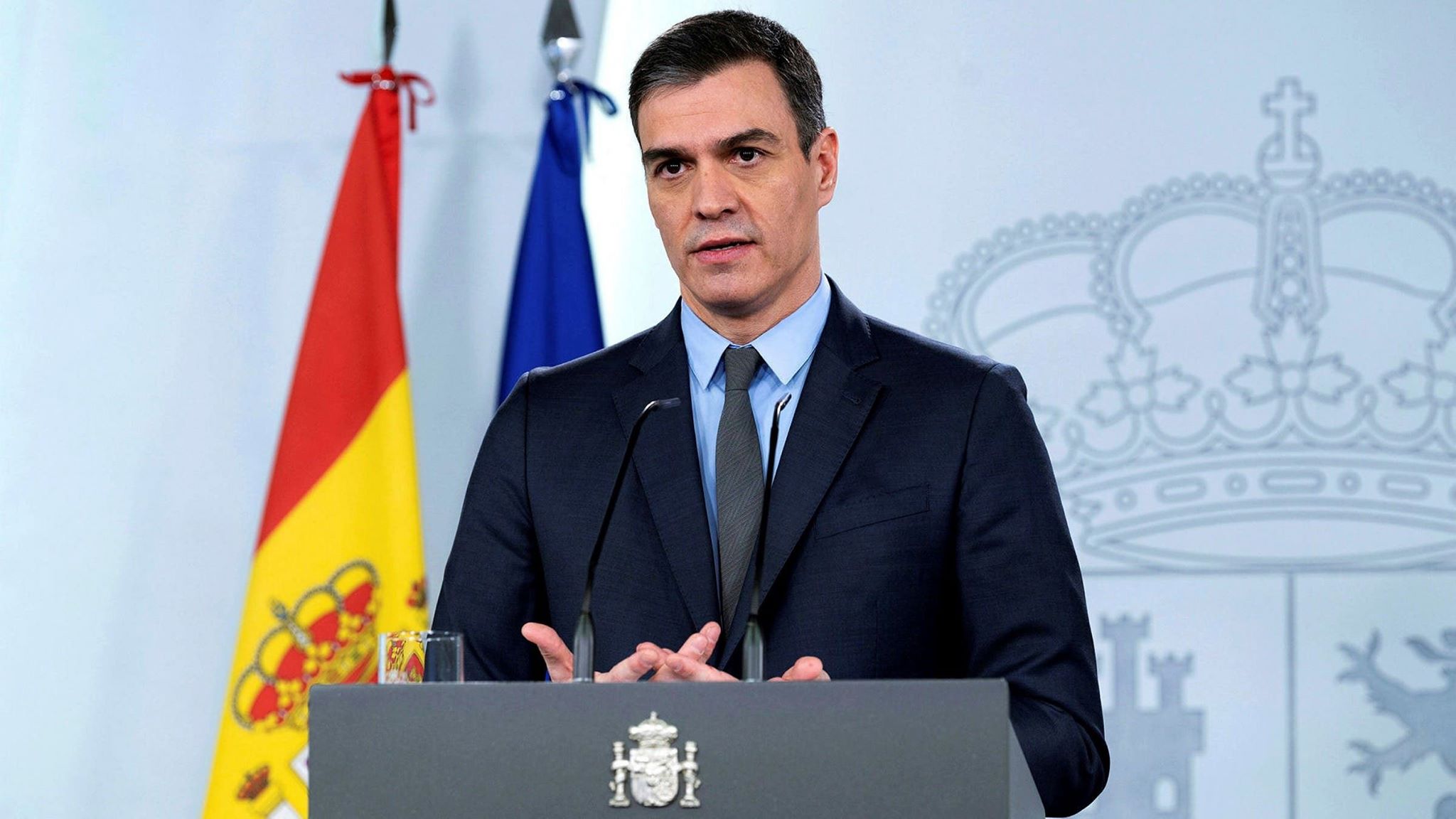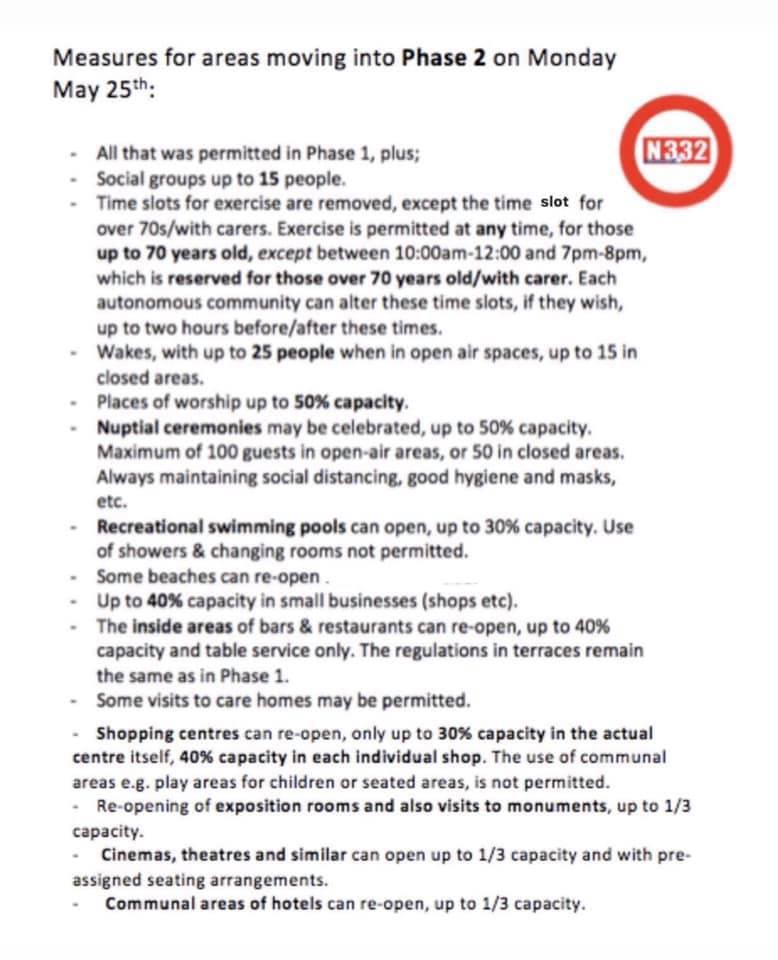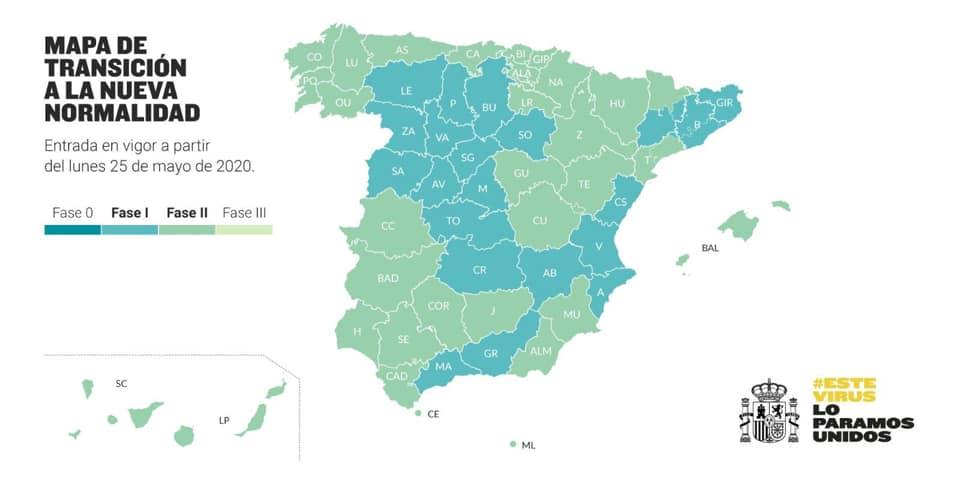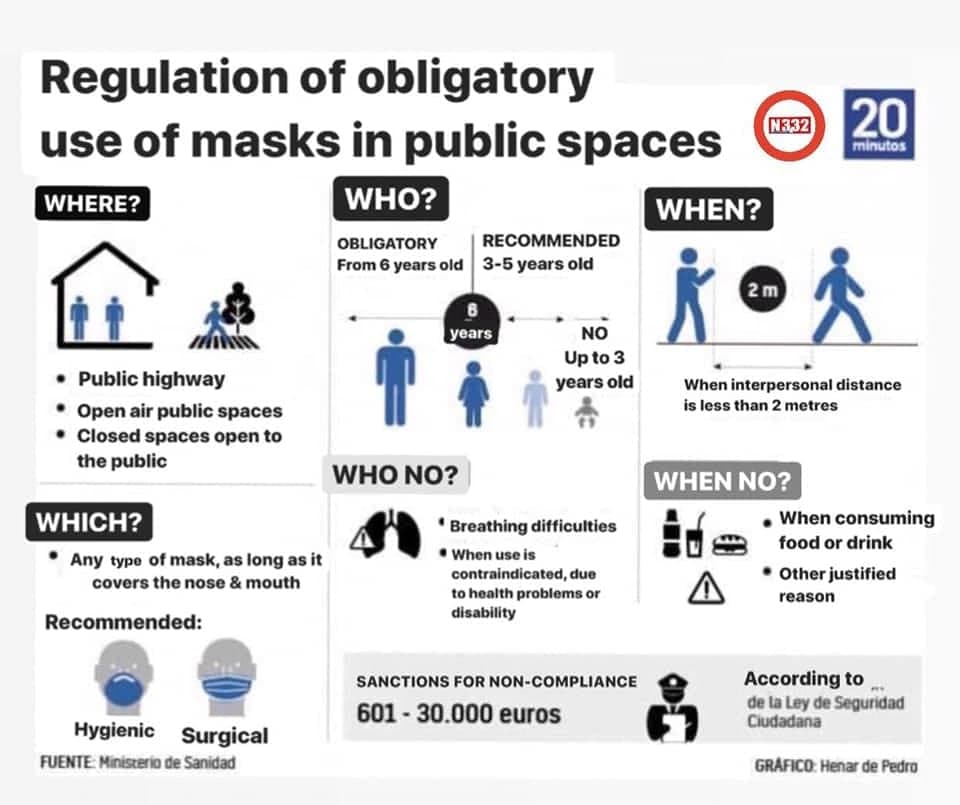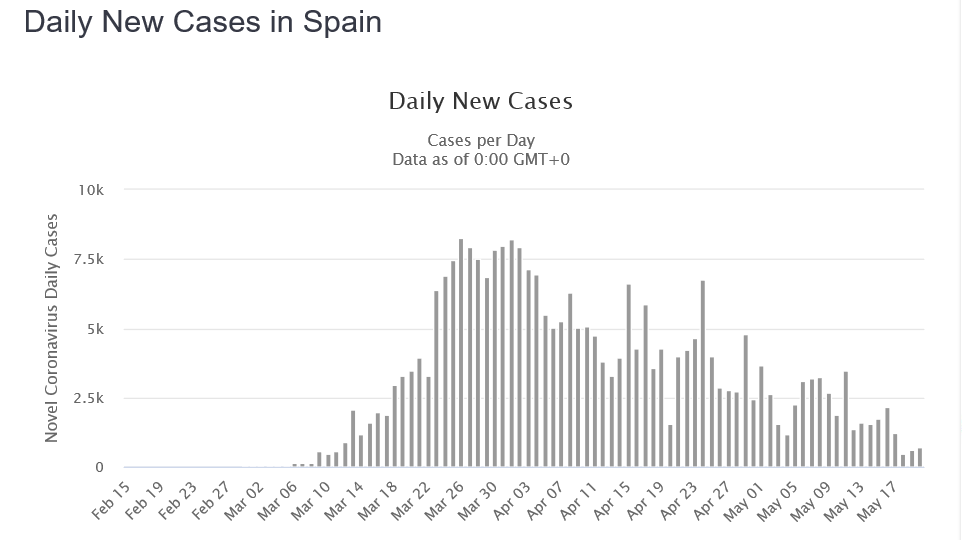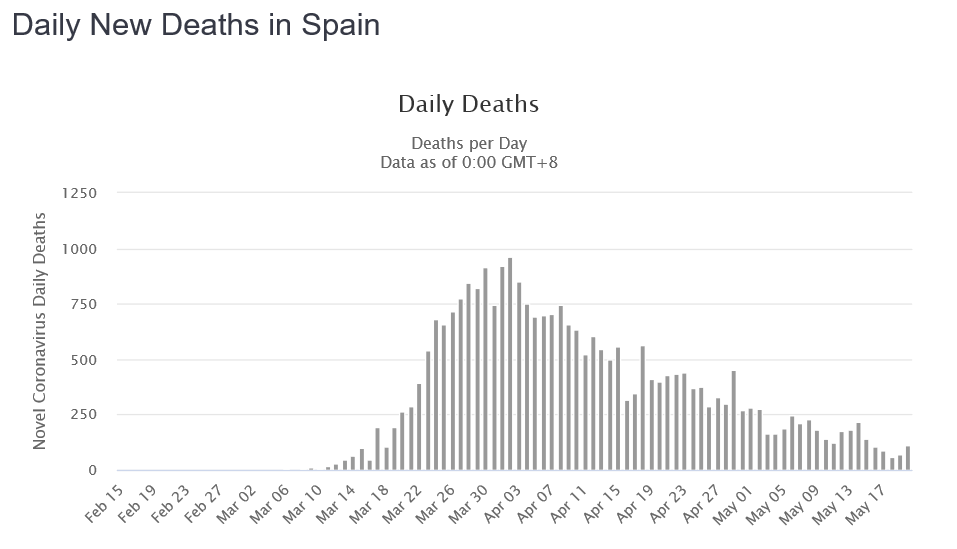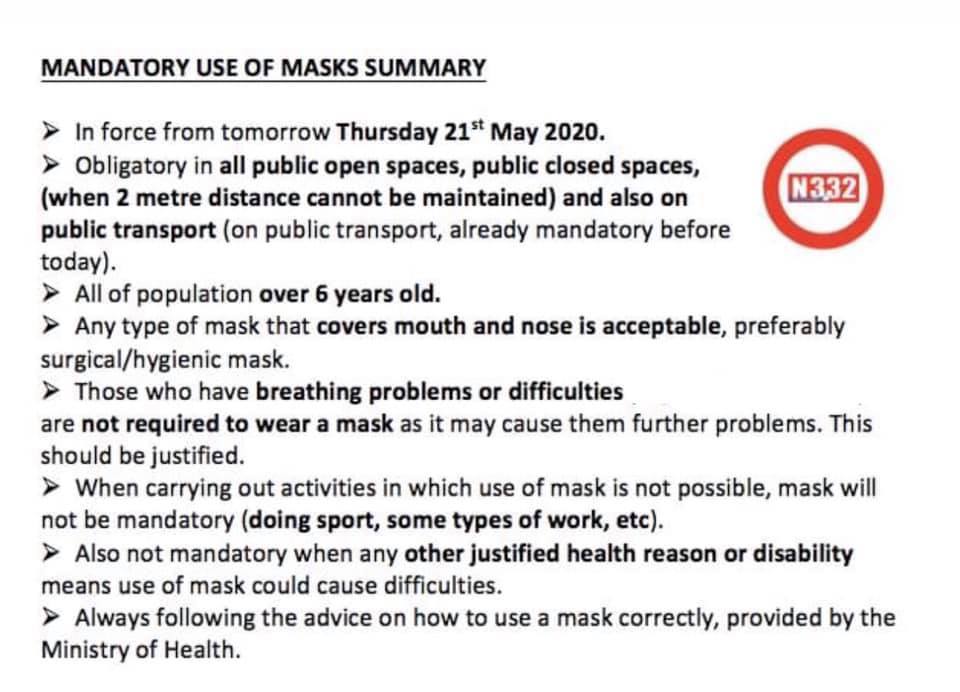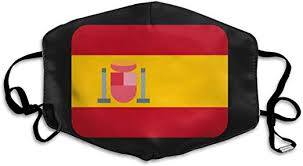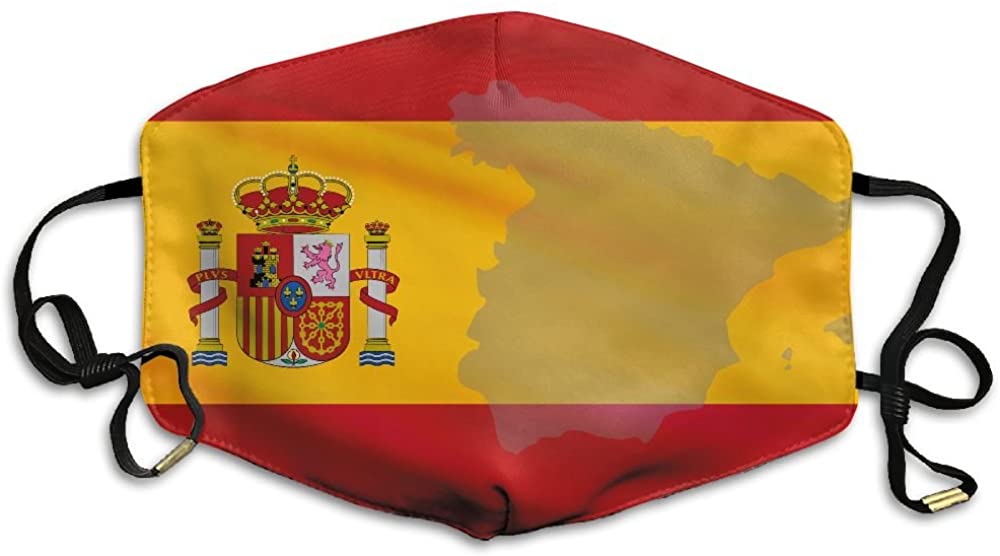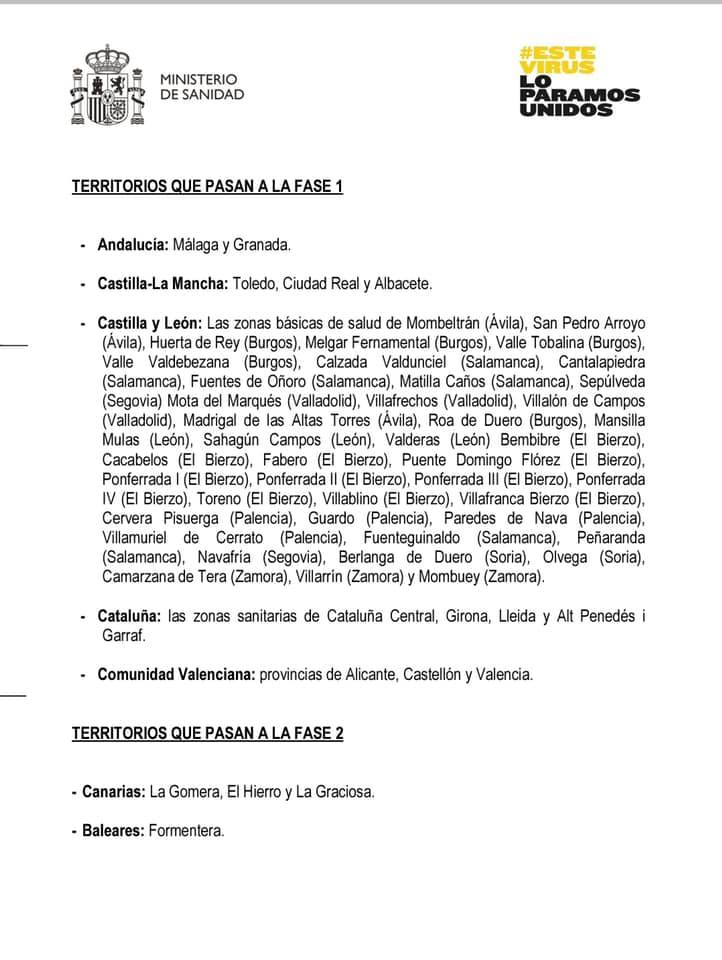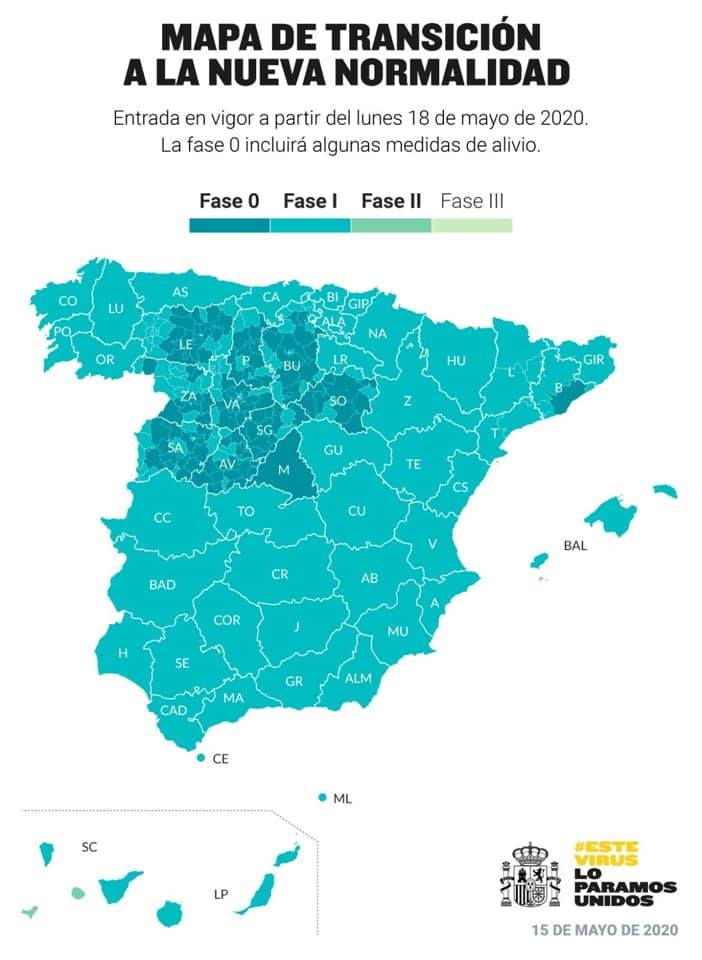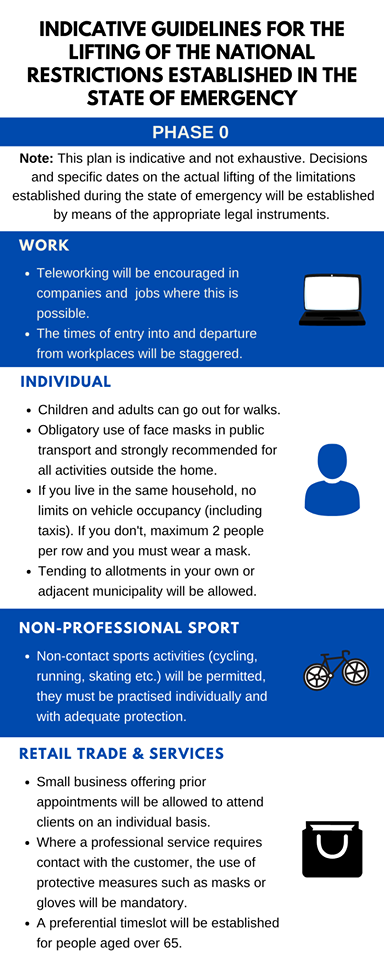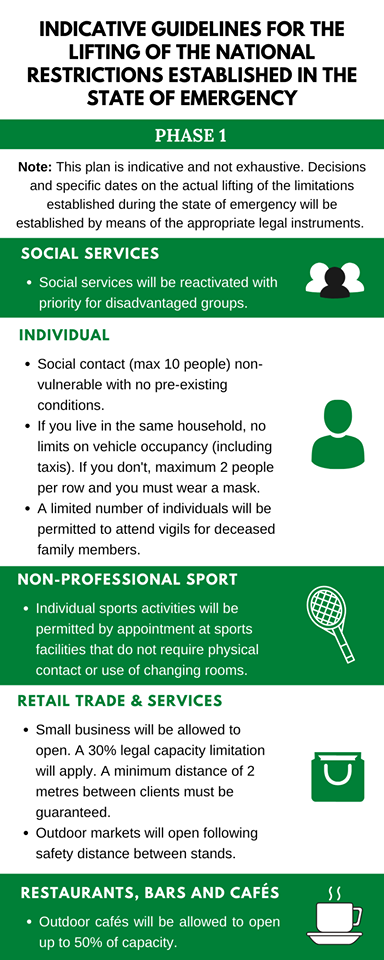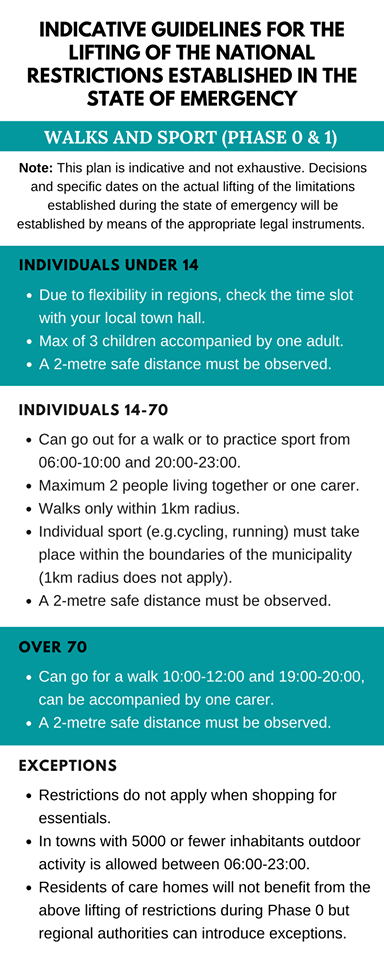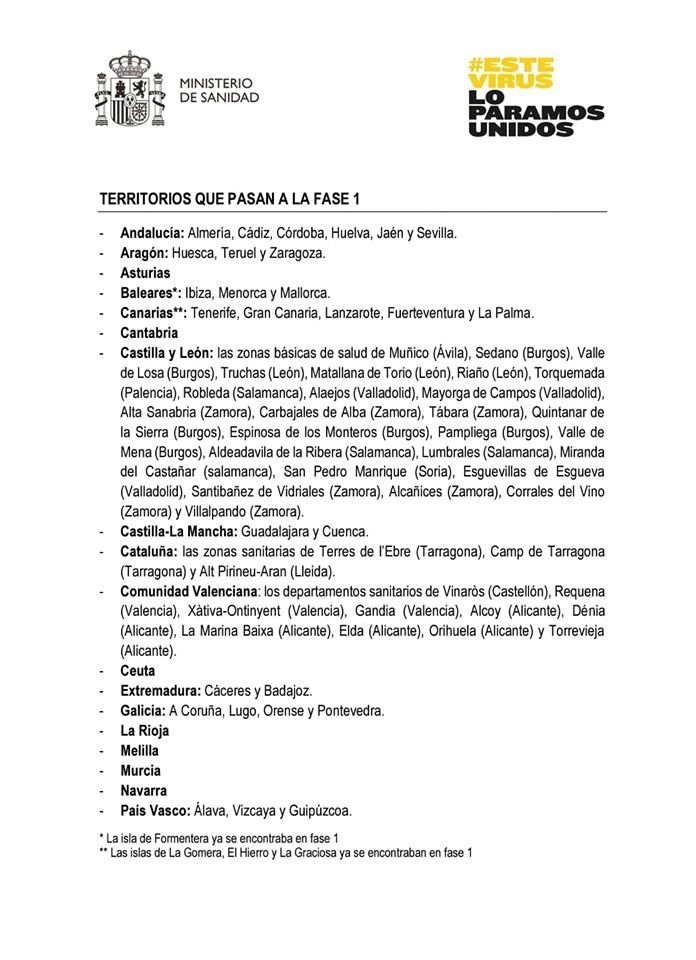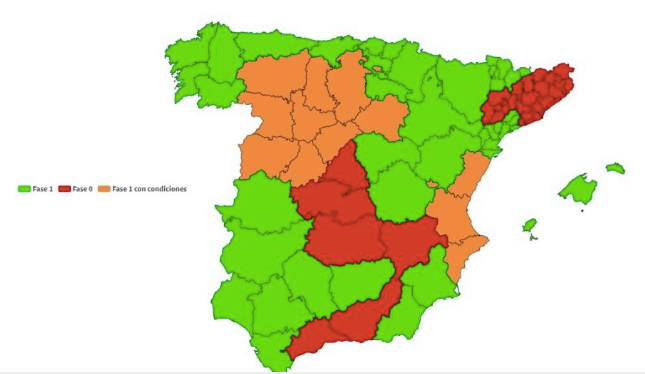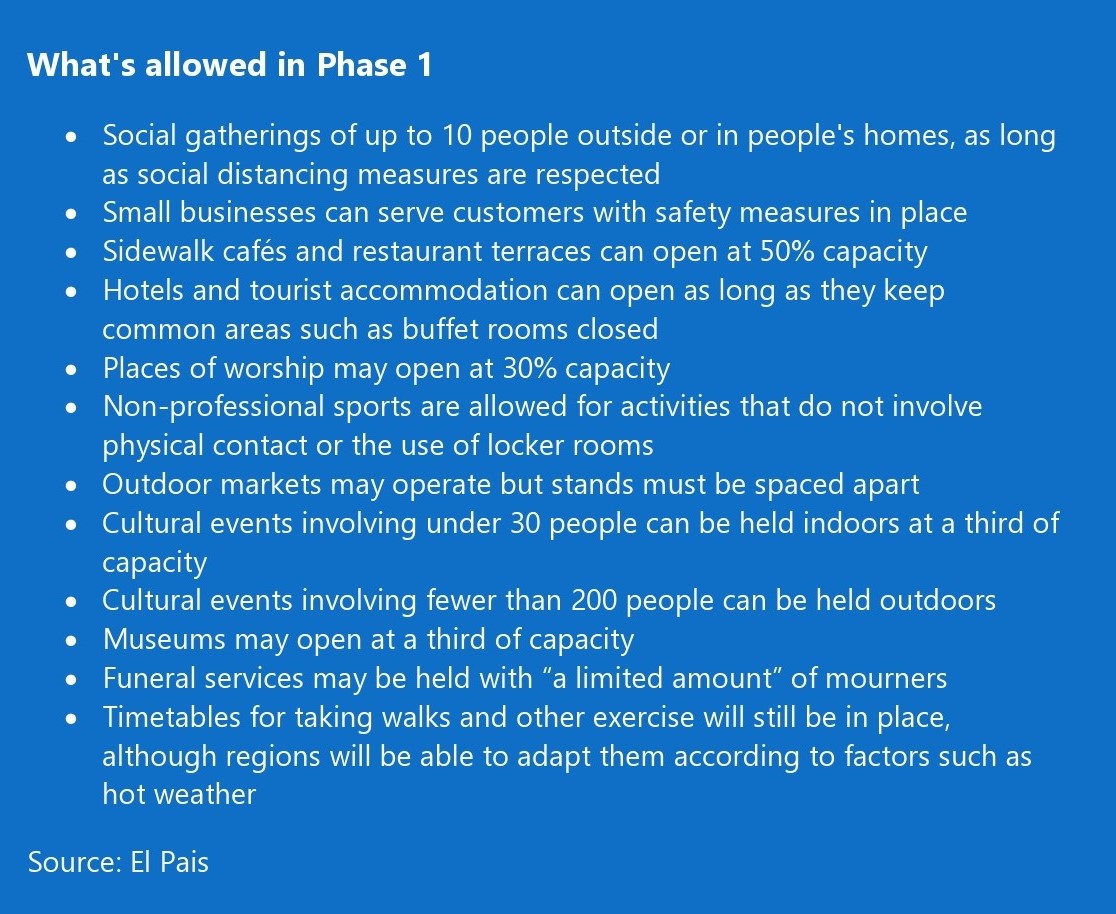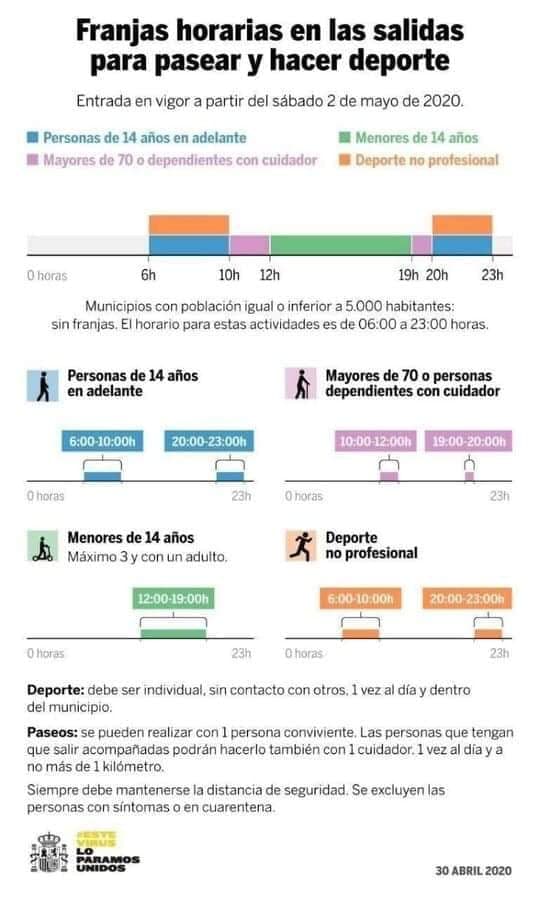On 14 March 2020, Prime Minister, Pedro Sanchez announced the lockdown to the nation, effectively banning people from leaving their homes except to go to work or buy essential supplies.
The ‘state of alert’, initially scheduled to last for 15 days, is reviewed on a fortnightly basis, and has and will be extended as appropriate. The Spanish government will continue to monitor the effectiveness of their lockdown measures, and further extensions will be considered, as and when necessary, to keep the public safe.
The lifting of restrictions will be phased in as appropriate, with the timing of each new phase being considered on a regional basis.
Read the STOP PRESS section for the latest updates as they happen. You can also find USEFUL LINKS at the bottom of the page.
STOP PRESS
June 20: ‘State of alert’ ends at midnight June 21
After 14 weeks of lockdown measures, ‘the ‘state of alert’ is finally coming to an end. Mobility restrictions will be removed, but hygiene & safety measures, to protect against a resurgence of the coronavirus, will remain in place. These measures include the compulsory use of face masks when it is not possible to maintain a safe distance of 1.5 metres.
The “new normality” measures will remain in place until the pandemic is considered to be over.
For further information, read El Pais here: https://english.elpais.com/society/2020-06-20/as-all-of-spain-enters-the-new-normality-on-sunday-what-will-change.html
Please note that any further updates, relating to future coronavirus measures, will appear on our new webpage: The “New Normality”
JUNE 14: Spain prepares for the final phase of lockdown measures from Monday 15 June
Most regions of Spain will enter the final de-escalation phase on 15 June, leading up to the end of the ‘state of alert’ on 21 June.
Phase 3 changes to lockdown measures
Exercise: all time bands completely removed
Meetings: Maximum number now 20 people but still observing social distancing & safety measures
Play areas: Public swings and playgrounds will open
Shops: All can now open, maximum capacity of 50%
Shopping centres: Common areas open at 40% capacity & observing social distancing measures; shops within shopping centres open at 50% capacity
Markets: 50% of the usual stalls can open
Hotels: Opening of common areas, including swimming pools & spas, at 50% capacity
Bars & Restaurants: Terraces open at 75% capacity, with a maximum occupancy of 20 people per table, indoor areas at 50% capacity
Pubs & clubs: 1/3 of its capacity, excluding dance floors
Funerals: Maximum 50 people in open spaces or 25 in closed spaces
Weddings & religious sites: Maximum of 150 people outdoors, 75 indoors, but not more than 75% maximum capacity
Cinemas, theatres: Pre-assigned seats with 50% of the capacity
Outdoor shows: maximum 800 people, seated & respecting social distancing
Museums, exhibition halls, cultural shows & libraries: maximum capacity of 50% & groups of up to 20
Casinos, gaming & recreational rooms: 50% capacity
Active & nature tourism: Allowed with groups of up to 30 people, or 20 people with a guide
Recreational centres, zoos & aquariums: 50% capacity, limited to 1/3 of capacity in closed spaces
Beach: Bathing is allowed on the beaches respecting social distancing & safety measures
Sports: Competitive sport can return, sports centres at 30% capacity
The use of a mask is mandatory on public roads, outdoor spaces & in closed spaces, when it is not possible to maintain a safe distance of at least 2 metres
JUNE 11: Compulsory 14-day quarantine will end July 1
The government are taking a series of steps to re-activate the tourist industry and have given a green light to a pilot scheme in the Balearic Islands.
From June 15, German visitors will be allowed to visit the Balearics – a similar scheme proposed for the Canaries was rejected by the regional authorities. This option will not be available for tourists from Britain, though talks are underway with the British authorities. Other regions are being invited by the government to launch their own pilot schemes.
Tourists arriving in the Balearics will have to complete a health form, have their temperature taken, provide contact details & confirm where they will be staying.
A similar process will be applied at all airports once Spain enters the ‘new normality’.
JUNE 10: Cabinet approve Royal Decree for the ‘New Normality’
Health Minister, Salvador Illa, announced yesterday measures that will be put in place until the government declares “that the crisis is over”. These safety measures will take effect once the ‘state of alert’ comes to an end on June 21.
The decree, which will be published in due course, includes the mandatory use of face masks in closed spaces, where a distance of 1.5 meters cannot be observed. The application of restrictions will fall to regional authorities. The legislation will also set out safety measures to be observed in schools, workplaces, hotels and shops.
For more on this story, read El Pais here: https://english.elpais.com/society/2020-06-09/spanish-cabinet-approves-decree-for-new-normality-after-coronavirus-state-of-alarm-ends.html
JUNE 10: Cabinet approve Royal Decree for the ‘New Normality’
Health Minister, Salvador Illa, announced yesterday measures that will be put in place until the government declares “that the crisis is over”. These safety measures will take effect once the ‘state of alert’ comes to an end on June 21.
The decree, which will be published in due course, includes the mandatory use of face masks in closed spaces, where a distance of 1.5 meters cannot be observed. The application of restrictions will fall to regional authorities. The legislation will also set out safety measures to be observed in schools, workplaces, hotels and shops.
For more on this story, read El Pais here: https://english.elpais.com/society/2020-06-09/spanish-cabinet-approves-decree-for-new-normality-after-coronavirus-state-of-alarm-ends.html
JUNE 5: New phase changes from 8 June
Health Minister, Salvador Illa, has announced the areas that will change phases on June 8. 52% of the Spanish population will now be in Phase 3 of the de-escalation process.
Central government will allow regional authorities to take control of the de-escalation process and decide how long this last phase should last.
Phase 1 to Phase 2
- Castilla y León
- Cataluña: Barcelona, Metropolitana Norte, Metropolitana Sur & Lleida
- Madridnidad Valenciana will stay in phase 2.
Phase 2 to Phase 3
- Andalucía
- Aragón
- Asturias
- Islas Baleares
- Canarias
- Cantabria
- Castilla-La Mancha: Guadalajara & Cuenca
- Cataluña: Alt Pirineu i Aran, Terres de l’Ebre & Camp de Tarragona
- Extremadura
- Galicia
- La Rioja
- Navarra
- Melilla
- Murcia
- País Vasco
Areas not mentioned will stay in their current phase. The Comunidad Valenciana will stay in phase 2.
For more Covid-related news (in English), go to the government website: https://www.lamoncloa.gob.es/covid-19/Paginas/index.aspx
For more news on this story, read El Pais here: https://english.elpais.com/society/2020-06-05/more-than-half-of-spain-moving-to-phase-3-of-coronavirus-deescalation-plan-on-monday.html
JUNE 3: Final extension to ‘state of alert’ agreed by parliament
Spain’s Prime Minister, Pedro Sánchez, secured a sixth and final extension today for the ‘state of alert’. The emergency powers were put in place on March 14, with the aim of halting the spread of the coronavirus. The measures will now stay in place until June 21 – a total of 14 weeks.
Next week, the Cabinet will approve a Royal Decree regarding health regulations and measures that will be in place as Spain exits the crisis.
These measures and regulations will be implemented jointly with regional governments, until such time as a vaccine is available.
For more on this story, read El Pais here: https://english.elpais.com/politics/2020-06-03/after-bitter-debate-in-congress-spains-pm-secures-extension-to-state-of-alarm.html
MAY 31: Further relaxation of lockdown measures from June 1
Health Minister, Salvador Illa, has announced the latest relaxation of lockdown measures, effective from June 1. These measures are expected to last for 14 days, though some regional authorities have requested permission to speed up the process. Over 32 million Spanish residents – 70% of the population – will now be in phase 2 of lockdown measures.
Moving from Phase 1 to Phase 2:
- Andalucia – Granada & Málaga
- Valencian Community – Castellón, Valencia, Alicante
- Castilla-La Mancha – Ciudad Real, Albacete, Toledo
- Murcia – Totana
- Catalonia – Girona, Cataluña Central, Alt Penedès, El Garraf
- Castilla y León – area of El Bierzo
Moving from Phase 2 to Phase 3:
- Balearic Islands – Formentera
- Canary Islands – La Gomera, El Hierro & La Graciosa
For further details on what’s allowed during lockdown phase 2, scroll down this webpage.
MAY 26: Quarantine for overseas visitors will be lifted on 1 July
At an inter-ministerial meeting yesterday, conducted by video call, government ministers agreed to lift the coronavirus quarantine for visitors from overseas.
Foreign Minister, Arancha González said that “the most difficult part is behind us. From July we will gradually reactivate international tourism, we will lift the quarantine and ensure safe health conditions.”
Read the full story here in El Pais: https://english.elpais.com/economy_and_business/2020-05-25/spain-will-lift-two-week-quarantine-on-overseas-arrivals-from-july-1.html
MAY 23: Foreign tourists can return to Spain from July
Prime Minister, Pedro Sánchez today announced the latest government measures during the coronavirus crisis and confirmed that the virus reproduction rate is now at 0.20.
The tourist sector can now start preparing for the summer season with Spain being open to foreign tourist from July. Sánchez encouraged Spaniards to start planning their vacations and said tourism would return “in safe conditions”.
In addition, Sánchez confirmed that the Spanish football championship will recommence w/c 8 June.
Read more in El Pais here: https://english.elpais.com/politics/2020-05-23/spanish-pm-foreign-tourists-will-be-able-to-return-to-spain-from-july.html
MAY 23: Lockdown restrictions loosened in municipalities with less than 10,000 inhabitants
New measures will take effect, regardless of which phase municipalities are currently in, as long as social distancing measures are observed:
- bars and restaurants can open – capacity restricted to 40%
- restrictions on exercising during scheduled timeslots will be lifted
- outdoor markets can open – with restrictions on occupancy
- churches can open – capacity restricted to 50%
- funerals can be attended by 15 people indoors, 25 outdoors
For those municipalities already in Phase 1
- meetings with friends can increase from 10 to 15 people
- outdoor sports facilities can be used – maximum 30% capacity
Further details can be found, in Spanish, in Boletín Oficial del Estado No. 144, on the government website: https://www.boe.es/boe/dias/2020/05/22/
MAY 22: New changes to lockdown phases effective from Monday 25 May
Health Minister, Salvador Illa, has announced further areas of Spain that will change phases on 25 May.
AREAS MOVING TO PHASE 1
- Castilla y León: Ávila, Segovia, Soria, Burgos, Palencia, León, Zamora, Salamanca y Valladolid.
- Cataluña: zonas sanitarias de ciudad de Barcelona, Metropolitana Sud y Metropolitana Nord.
- Madrid
AREAS MOVING TO PHASE 2
- Andalucía: Almería, Córdoba, Cádiz, Huelva, Jaén y Sevilla.
- Aragón: Huesca, Zaragoza y Teruel.
- Asturias
- Islas Baleares: Ibiza, Menorca y Mallorca.
- Canarias: Tenerife, Gran Canaria, Lanzarote, Fuerteventura y La Palma.
- Cantabria
- Castilla-La Mancha: Guadalajara y Cuenca.
- Cataluña: zonas sanitarias de Campo de Tarragona, Alto Pirineo y Arán y Las Tierras del Ebro.
- Extremadura: Cáceres y Badajoz.
- Galicia: Lugo, La Coruña, Orense y Pontevedra.
- Murcia
- Navarra
- País Vasco: Guipúzcoa, Vizcaya y Álava
- La Rioja
- Ceuta
- Melilla
The whole of the Valencian Community remains in Phase 1.
What’s allowed in Phase 2
- Restaurants (those without terraces), theatres and cinemas can open but ‘with limitations’ – 1/3 capacity and with table service
- Outdoor cultural events can be held with a maximum of 400 people – but only if seated and with social distancing measures in place.
- Cultural gatherings indoors can be held with a maximum of 50
- Historic visitor attractions (not theme parks) and monuments can open with 1/3 capacity, and for pre-arranged group or guided visits only.
For further information, read Spain in English here: https://www.spainenglish.com/2020/05/22/lifting-lockdown-spain-full-details-phases/
MAY 21: ‘State of alert’ extended until 7 June
Congress has narrowly voted in favour of a further 2-week extension to the ‘state of alert’, to 7 June.
It is expected that Prime Minister, Pedro Sánchez will ask for one further and final extension after this one. The timing would then coincide with the national coronavirus de-escalation plan, which will be coming to an end, late June, across most of the country.
On 20 May, the number of deaths recorded rose slightly to 110, after 3 consecutive days of less than 100 deaths. The number of new cases daily also continues to fall.
The Prime Minister told Congress, “The state of alarm will not last one day longer than necessary. Nobody has the right to throw away what we have all achieved together”.
For more on this story, read El Pais here: https://english.elpais.com/spanish_news/2020-05-20/spanish-pm-finds-support-in-congress-for-fifth-extension-to-state-of-alarm.html
MAY 20: The wearing of face masks is made mandatory from 21 May
The new rules regarding the compulsory wearing of face masks will come into effect on Thursday 21 May, except in certain circumstances.
See graphic from N332 (Road Safety Association) for further details or read the Boletín Oficial del Estado no. 142, from the Agencia Estatal here: https://boe.es/boe/dias/2020/05/20/
MAY 18: The wearing of face masks to become mandatory in public spaces
On Sunday May 17, Health Minister, Salvador Illa announced that the Ministry of Health will shortly make the wearing of face masks compulsory in public spaces. Until now, it has only been required to wear masks on public transport. Work is currently under way to draft a ministerial order, which will be published “in the coming days”.
It is likely that the wearing of masks will become obligatory in businesses and closed public spaces, but it is unclear as to whether they will be required on the street.
MAY 18: Relaxation of exercise restrictions in some areas
The current measures allocating exercise timetables to specific groups of people are likely to be relaxed in some areas. At present, municipalities with less than 5,000 inhabitants are exempt from these restrictions, and all residents are free to exercise at any time of day. They must, however, abide by other regulations, i.e. once a day only, maximum of 1 hour, within 1 km radius of their residence and with only one other family member.
These timetable restrictions will soon also be removed for municipalities with up to 10,000 inhabitants.
Further details will be announced shortly, but read here more in El Pais:
https://english.elpais.com/society/2020-05-17/spains-health-ministry-will-make-masks-obligatory-beyond-just-public-transport.html
MAY 17: Prime Minister Sánchez to ask Congress for one last extension to ´state of alert´
The Spanish PM made a televised address yesterday afternoon, announcing his intention to request one last extension, this time for one month. He said the de-escalation process would be completed in half of the country by the beginning of summer.
He stated that the lockdown was working and that “the path we are taking is the only one possible”.
For the full story, read the article in El Pais here: https://english.elpais.com/politics/2020-05-16/spanish-pm-will-request-one-last-extension-of-the-state-of-alarm-this-time-for-a-month.html
MAY 16: Lockdown restriction changes – areas moving to new phases effective from 18 May
Health Minister, Salvador Illa, announced changes this weekend to the lockdown levels in certain areas. Further information will be available soon.
Phase 0 to Phase 1
- Malaga
- Granada
- All of Valencian Community
- Some areas of Castilla & León
- All of Cataluña, except for Metropolitan Barcelona
- Cuidad Real
- Toledo
- Cuenca
Phase 1 to Phase 2
- Islands of Formentera, La Gomera, El Hierro & La Graciosa
Source: N332 – Road Safety Association
MAY 16: Non-essential travel restrictions extended for international travellers
Effective immediately, restrictions for non-essential travel have been extended until 15 June.
The order stipulates that the authorities may turn away EU citizens and their relatives for public health reasons, if they are not “registered as residents of Spain, or headed directly to their place of residence in another members state, Schengen-associated state or Andorra”.
The travel restrictions will therefore extend beyond the current termination date of the ´state of alert´.
Source: Boletín Oficial del Estado – No. 136, 15 May.
For further information (in Spanish), go to the official government website here: https://www.boe.es/boe/dias/2020/05/15/
Or read more on this subject in El Pais here: https://english.elpais.com/society/2020-05-15/spain-to-extend-restrictions-on-international-travelers-until-june-15.html
May 12: Two-week quarantine for all overseas travellers from 15 May
The Spanish government has ordered a two-week quarantine for all overseas travellers entering the country in a bid to curb the spread of the virus.
Incoming travellers will have to remain indoors except to shop for essentials such as food and medicine.
The quarantine will remain in force throughout the duration of the “state of alert”, which is currently due to end on 24 May.
The measures apply to all travellers, including Spanish citizens returning to the country. Only lorry drivers, airplane and ship crews, cross-border workers and health staff who are entering Spain to work will be exempt.
Read more on this story from El Pais here: https://english.elpais.com/society/2020-05-12/spain-to-introduce-14-day-quarantine-for-international-travelers.html
MAY 11: British Embassy provides updates re Phase 1 de-escalation measures
As of today, many parts of Spain are moving into Phase 1, while others remain in Phase 0. The timetables & existing rules for walks & exercise remain in place during both phases, but regional governments may introduce some changes.
One important rule change is regarding travelling in private vehicles. Those who live in the same residence will now be able to travel in the same car, occupying all of the seats, & without the need to wear masks.
Please see the infographics for further details but note that these do not include all measures. Full details can be found on the Spanish government website here: https://www.lamoncloa.gob.es/covid-19/Paginas/index.aspx
For further details direct from the British Embassy, go to their Facebook page here: https://www.facebook.com/BritsInSpain/
MAY 9: Spanish government announce areas of Spain that will implement Phase 1 next week
From Monday 11 May, selected areas will implement Phase 1 of de-escalation measures, expected to last for two weeks. In some regions, the designated areas have been selected based on “health zones” rather than provinces. Travel outside of your province will not be permitted.
Those areas not selected will remain in Phase 0 for the time being. Further announcements will be made in due course.
For further details, in Spanish, read the Agencia Estatal ‘Boletín Oficial del Estado´ here:
https://www.boe.es/diario_boe/txt.php?id=BOE-A-2020-4911
Or read the article – “As half of Spain moves to Phase 1 of coronavirus deescalation, what will change?” – in El País here:
https://english.elpais.com/society/2020-05-09/as-half-of-spain-moves-to-phase-1-of-coronavirus-deescalation-what-will-change.html
MAY 6: State of Alert extended until May 24
Prime Minister Pedro Sánchez has today secured a fourth extension to the state of alert. He warned that a further extension of ‘several more weeks’ would be needed to see Spain through the four-stage de-escalation process. Sánchez stressed the need to limit freedom of movement in order to defeat the virus, saying that it would be a ‘grave irresponsibility, an absolute and unforgivable error’ to end the state of alert too soon.
MAY 2: Prime Minister announces the lifting of some lockdown restrictions, effective May 4
- Small businesses, such as bookstores, garages, hardware stores, clothing or shoe repair workshops, hairdressers, will be able to open with the following conditions:
⇒ Only by prior appointment
⇒ One customer per employee only
⇒ Special timetable for seniors (to coincide with their allotted exercise time slots)
- Restaurant and bars may open for takeaway food only, with orders being placed over the phone/on the internet
- Face masks will be obligatory on public transport -14.5 million masks will be distributed via transport hubs, municipalities & social institutions
- Given the low level of infections, the Spanish islands of Formentera, El Hierro, La Graciosa & La Gomera will see further relaxation of lockdown measures
The prime minister also announced his intention to request a further two-week extension to the ‘state of alert’.
For further information, read El Pais in English here: https://english.elpais.com/politics/2020-05-02/spanish-pm-face-masks-will-be-obligatory-on-public-transport-from-monday.html
Or read El Mundo in Spanish here: https://www.elmundo.es/espana/2020/05/02/5ead5b22fdddff28048b45ce.html
MAY 1: Full conditions of relaxation of lockdown restrictions regarding exercise – effective from May 2 2020
Translated from BOE – https://www.boe.es/eli/es/o/2020/04/30/snd380
Article 2. Movements allowed for the practice of physical activity.
- People aged 14 and older may circulate on roads or spaces for public use for the practice of physical activities permitted by this order, in accordance with article 7.1(e), (g) and (h) of Royal Decree 463/2020 of 14 March declaring the state of alarm for the management of the health crisis situation caused by COVID-19.
- For the purposes of this order, the non-professional practice of any individual sport that does not require contact with third parties, as well as walks, is permitted.
Such activities may be carried out once a day and during the time slots provided for in Article 5. - During walks you can go out accompanied by one person with whom you live. However, those persons who have to be accompanied may also go with a person employed by a care home or regular caregiver.
Non-professional individual sports that do not require contact can only be performed individually. However, persons who have to be accompanied may go out with a person with whom they live, a person employed by a care home or a regular caregiver.
- Walks shall be taken no more than one kilometre from the home. This limitation shall not apply to the non-professional practice of any individual sport, this being permitted within the municipality where you reside.
- Persons who have symptoms or are in home isolation due to a diagnosis for COVID-19 or who are in a period of home quarantine because they have had contact with any person with symptoms or diagnosed with COVID-19 may not make use of the permissions contained in paragraph 1. In addition, residents of senior social health centres may not make use of such permission.
- The movements referred to in this Article do not affect those generally permitted in Article 7 of Royal Decree 463/2020, March 14, as well as under Order SND/370/2020, of April 25, on the conditions under which outings by children must take place during the health crisis caused by COVID-19.
Article 3. Requirements for avoiding contagion
- During the practice of the physical activities authorised under this order, individuals must maintain a distance of at least two metres from others.
- Avoid busy areas and spaces where people may gather.
- As far as possible, the physical activity permitted under this order must be carried out continuously, without stopping unnecessarily in streets or public spaces. When it is necessary to stop in the street or a public space, due to the physical condition of the individual, this pause should only be for the time strictly necessary.
- All the prevention and hygiene measures related to COVID-19 recommended by the health authorities must be observed.
- To enable persons to maintain safe distances, local authorities may redistribute the use of public spaces to favour pedestrians and cyclists, in that order.
Article 4. Permitted spaces.
- Persons may circulate on any road or public space, including authorised natural spaces and green areas, provided these respect the limits established in this order.
- It is not permitted to enter closed sports facilities to practice the activities allowed under this order.
- It is not permitted to use a motorised vehicle or public transport to travel to streets or public spaces in order to practice the activities allowed under this order.
Article 5. Time slots.
- The following time slots are established for the practice of the activities allowed under article 2.2:
- a) Individual sports and walks may only take place between 6 am and 10 am and 8 pm and 11 pm.
- b) Persons who need to be accompanied and persons over 70 may practice individual sport and walk between 10 am and 12 pm and between 7 pm and 8 pm. Persons over 70 may be accompanied by a person between the ages of 14 and 70 who lives with them.
- The time slots indicated in this order will not apply to municipalities, or smaller, separate populated areas within a municipality forming an administrative area, which have a population of 5,000 or less, where the activities allowed under this order may take place between 6 am and 11 pm.
- Exceptionally, these time slots do not apply when, for duly accredited medical reasons, physical activity is recommended in another period, or because the persons accompanying older people, minors or the disabled cannot do so within the allotted time slot.
El Pais Interactive map: How far can adults go for a walk under Spain’s relaxed confinement measures? https://english.elpais.com/society/2020-05-01/interactive-map-how-far-can-adults-go-for-a-walk-under-spains-relaxed-confinement-measures.html
APRIL 30: Relaxation of lockdown restrictions regarding exercise, effective from 2/5/20
The Spanish health authorities today announced new rules for outdoor activity. Health Minister, Salvador Illa, said that individuals can go out once a day, within their own municipality of residence, without making contact with third parties. Sports are also allowed as long as practiced individually.
Adults will be able to walk alone, or with one other family member, for up to an hour, and within one kilometre radius of their residence.
- Walks and sport for healthy adults: 6.00-10.00 and 20.00-23.00
- Walks for dependent persons (with a caregiver) and over-70s: 10.00-12.00 and 19.00-20.00
- Exercise with children (under current conditions): 12.00-19.00
In municipalities with less than 5000 inhabitants, time restrictions will not apply, though all activities must take place between 6.00 and 23.00.
APRIL 28: Prime Minister announces de-escalation plan
In a press conference today, Pedro Sánchez announced that the Council of Ministers have approved a de-escalation plan for lockdown.
There will be no fixed dates for certain phases of de-escalation, but the situation will be reviewed every 2 weeks, & each new phase will last for a minimum of 2 weeks.
The phases will be the same in every region/area/territory of Spain but will be implemented at different speeds, dependent on the evolution of the virus. If all goes to plan, the “new normality” could happen by the end of June.
For further details, read here: https://english.elpais.com/spanish_news/2020-04-28/spanish-government-will-avoid-setting-dates-for-deescalation-measures.html
APRIL 26: Spain may allow confined citizens out for walks on May 2, says Prime Minister Sánchez
From today, rules are being relaxed allowing children under 14 to accompany a parent on a short walk.
At an evening news conference on April 25, the prime minister stated that if contagion figures continue to go down, lockdown rules would be relaxed even further.
Sánchez said, “If the evolution of the pandemic keeps moving in a positive manner, starting on May 2 outings will be allowed for individual activity and for walks with the people that we live with.”
For the full story in El Pais, click here: https://english.elpais.com/spanish_news/2020-04-25/spain-may-allow-confined-citizens-out-for-walks-on-may-2-says-pm.html
APRIL 22: Congress authorises a third extension to the “state of alert”
As expected, Prime Minister Pedro Sánchez gained approval for a further extension to the lockdown period, in a bid to combat the spread of COVID-19. The special measures will remain in place until May 9. Sánchez warned that the de-escalation of coronavirus confinement measures would be “slow and gradual”, and that the “general confinement will not be lifted until we are ready.”
Read the full story in El Pais here: https://english.elpais.com/politics/2020-04-23/spanish-pm-secures-support-to-extend-state-of-alarm-after-fierce-opposition-criticism-in-congress.html
From Sunday 26, rules will be relaxed regarding children under 14, who will now be allowed to go shopping with their parents, and for short walks.
For further information about the rule change regarding minors, read The Local article here: https://www.thelocal.es/20200421/what-we-know-about-spains-rules-on-children-leaving-the-house-during-lockdown
APRIL 15: Congress reserves April 22 for a possible further extension of the state of alert
The Council of Ministers will discuss the possibility of a further extension of the lockdown period when they meet next week. Any proposal put forward for a further 2 weeks would then need approval by parliament and would extend the lockdown until May 10.
For the full story (in Spanish) from La Vanguardia, click here: https://www.lavanguardia.com/politica/20200414/48510213795/coronavuros-prorroga-estado-alarma-11-mayo.html
APRIL 13: Some lockdown restrictions lifted
Spain’s non-essential workers, in sectors such as construction and industry, return to work, restoring the level of lockdown to the earlier level of the first 2 weeks. Strict measures are still in place for the vast majority.
APRIL 10: Congress backs PM’s request to extend state of alarm in Spain until April 26, with a further 15 days likely
“Spanish Prime Minister Pedro Sánchez secured approval from the Congress of Deputies on Thursday for his decision to extend the state of alarm in Spain and current confinement measures until April 26. The move, which will keep residents of Spain mostly locked down in their homes for an additional two weeks from the previous deadline of April 12, is aimed at curbing the spread of the coronavirus.”
For the full story from El Pais, click here: https://english.elpais.com/politics/2020-04-10/congress-backs-pms-request-to-extend-confinement-measures-in-spain-until-april-26-with-a-further-15-days-likely.html
We will endeavour to keep everyone updated with the latest information regarding the rules of lockdown. Please check back regularly for further information & advice.
We have also provided advice and suggestions on how to stay safe, healthy, physically and mentally, and how to keep yourself busy and entertain the family during this time of crisis. For more information and useful links, click right
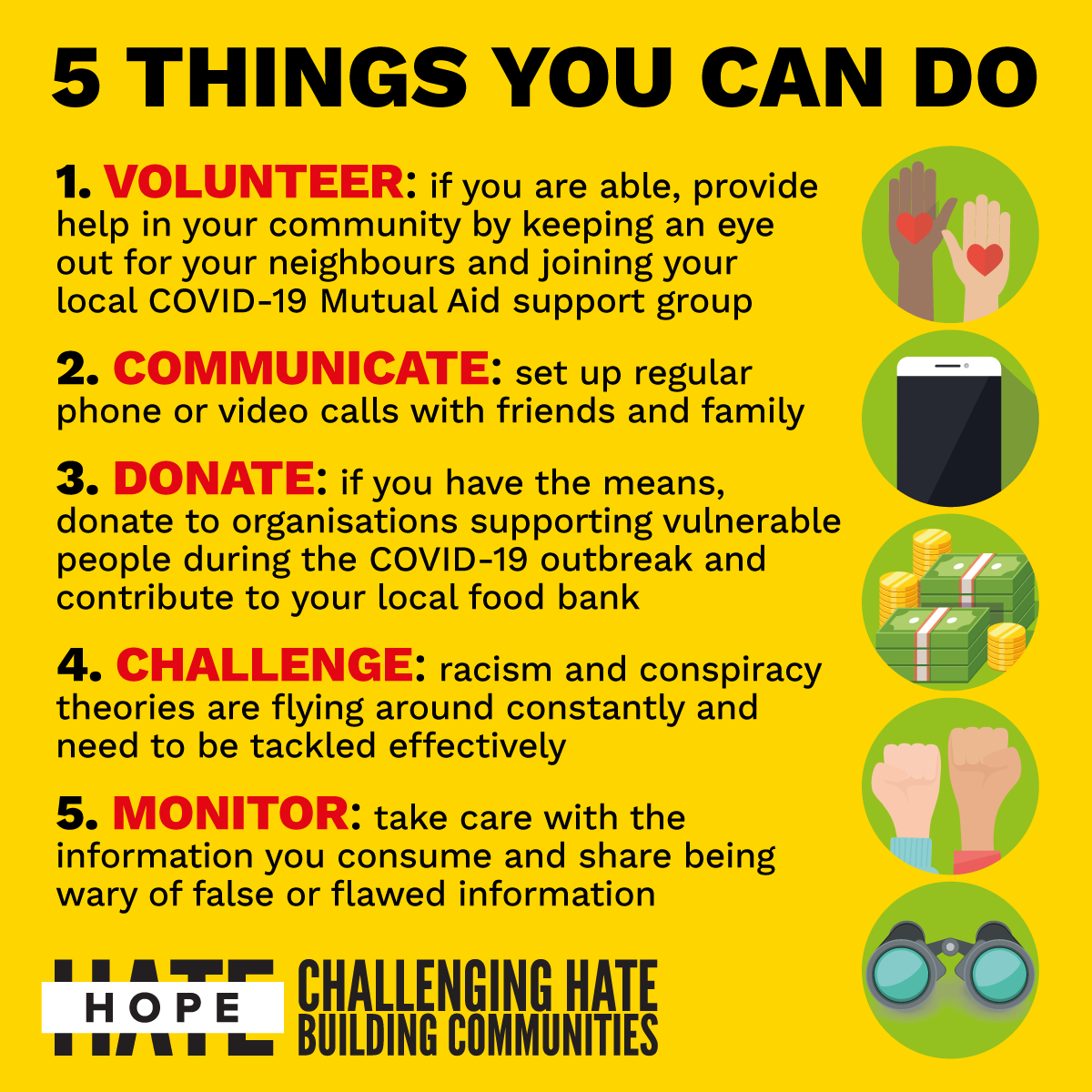
Stay home…
stay safe…
& look out for
each other!
USEFUL LINKS:
Worldometers monitor the number of cases & death tolls, by country: https://www.worldometers.info/coronavirus/
Institute for Health Metrics & Evaluation (IHME) COVID-19 death toll projections for Spain: https://covid19.healthdata.org/spain
For updates about the lockdown rules – Boletín Oficial del Estado: https://www.boe.es/index.php?lang=en
The Spanish government website has all the latest news from Spain, in English: https://www.lamoncloa.gob.es/lang/en/Paginas/index.aspx
N322 Road Safety Association has a wealth of information about lockdown measures on their Facebook page:
https://www.facebook.com/DrivingSpain/
European Commission coronavirus home page: https://ec.europa.eu/health/coronavirus_en
WHO specific information on Spain: http://www.euro.who.int/en/countries/spain
WHO specific information on UK: http://www.euro.who.int/en/countries/united-kingdom-of-great-britain-and-northern-ireland
Spanish Ministry of Health, Consumer Affairs & Social Welfare: https://www.mscbs.gob.es/en/home.htm
Spanish Ministry of the Environment: https://www.miteco.gob.es/es/ministerio/medidas-covid19/
UK Foreign Office travel advice for Spain: https://www.gov.uk/foreign-travel-advice/spain
Brits in Spain (British Embassy in Madrid) Facebook Page: https://www.facebook.com/BritsInSpain/
Brits in Spain website: https://www.gov.uk/guidance/living-in-spain#coronavirus
Check back frequently for updates on the latest lockdown measures, as new material will be added regularly. Thanks!


